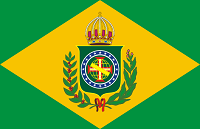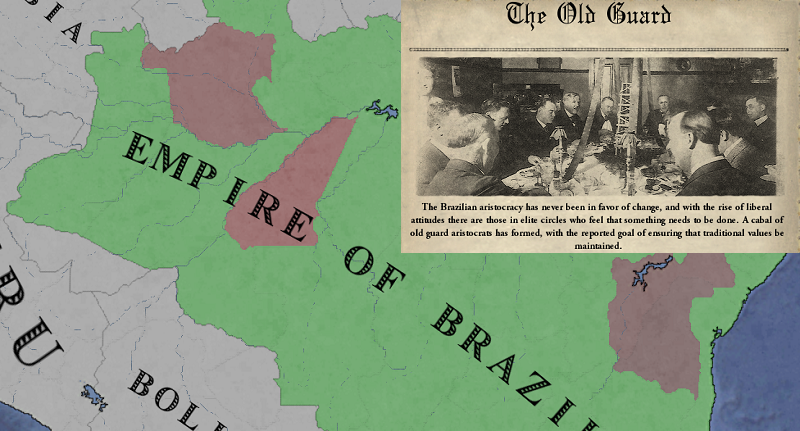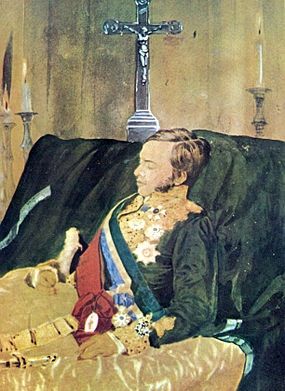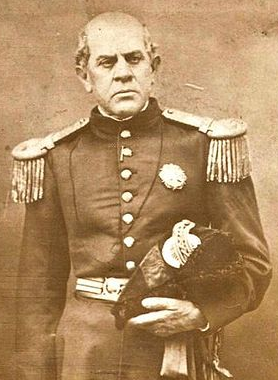VIII. Law of the Circles
Thousands of Brazilians died during the global cholera pandemic |
Emperor Pedro (centre)
and Carneiro Leao (right)
visit cholera victims
The summer of 1854 saw cholera ravage the sugar plantations of north-eastern Brazil. The outbreak was just part of a global pandemic, the worst of the 19th century [1]. Spreading from Bengal out across British trade routes, 10,000 died in London alone, with the disease reaching as far as the Russian steppe and Sahara desert. Cholera was relatively rare in South America, leaving doctors struggling to battle the contagion. The bustling port of Recife proved the epicentre. The cause of cholera then unknown, a contaminated water supply (despite several rivers running through Recife they were a common dumping ground for waste) saw the number of cases multiply rapidly. The main symptom rapid dehydration caused by diarrhoea, the obvious treatments only worsened patients' conditions. The crisis quickly turned political as the Governor of Pernambuco, Paulo Camara, refused to enforce a quarantine on the grounds it would hurt sugar exports. During the Fuijo regency of the 1830s power had been greatly decentralised to the provinces [2], leaving the capital unable to override Camara. As ever, news of his people suffering deeply upset Pedro II while the Prime Minister was furious that a Conservative governor would not heed his government's requests. As new cases were reported in neighbouring provinces, the two men used the only weapon to hand; public relations. Leao and the Emperor headed north by boat to visit the overcrowded infirmaries of Recife.
The mission was applauded across the nation, triggering an outpouring of charitable aid to the beleaguered city. Nonetheless Camara remained in power, his position thoroughly -if now quietly- endorsed by the region's plantation owners. It was just the latest in a string of events that had angered Leao with regards to the division of power between Rio de Janeiro and the provinces. As early as the Farrapos Revolt, the Fuijo reforms had caused problems, with governors withholding conscripts on the grounds of 'economic necessity', the men in question often merely the servants of prominent aristocrats. The Angolan slave trade, though greatly reduced was still illegally ongoing, with coastal provinces turning a blind eye. Worst of all for the capital was the issue of taxation. The provincial bureaucracies were infamously corrupt and inefficient. Tax collectors were often unpaid appointments, with the unspoken understanding they should look to their own remuneration. A mere fraction of revenues reached Rio de Janeiro, greatly hampering government projects. Past efforts to correct this imbalance by the Courtiers regime had met with failure. The main centre of resistance had not been from the Senate lords, who tended to quickly decamp from the provinces for Rio high society, but the Chamber of Deputies. Frequently populated by favourite sons, and even provincial officials, the lower house had been firmly opposed to centralisation ever since Fuijo overthrew the “arch autocrat” Andrada, Pedro's first regent.
At the same time the Liberals under Dom Alegre had begun to find new purpose. The Telegrafo Affair had been latched on to, though the outrage had been wisely focused on the Prime Minister rather than the Emperor. Liberal Senators hounded the government, demanding a truly free press. Again and again the issue was slapped down by the Caramura, while the Conservatives remained surprisingly quiet over the topic. Ironically Vasconcelos, as Interior Minister the true instigator of
O Telegrafo's ban, was the most sympathetic to Alegre's motion. Various free speech associations began to form amongst the urban middle-class. Though local groups' memberships more often numbered in the hundreds rather than the thousands, they provided a kernel of Liberal support beyond their southern heartlands. The fall out from the Cholera epidemic was also eagerly embraced. Historically, the Liberal faction was the party of the provinces, being the direct successors of Fuijo's Nativists. However now a party in need of a purpose, Alegre was happy to attack Leao's “unwillingness” to resolve the issue in Pernambuco. Calls for martial law were perhaps histrionic but coupled with rumours of misappropriation of donations to the cholera infirmaries by Recife's Conservative machine politicians, they hit the government hard. Guided partly by his own views and partly by this growing pressure, Leao embarked on a major new programme of reform in early 1855.
Known as the “Law of the Circles” [3], the Prime Minister proposed a collection of legislation aimed at overhauling the civil service, electoral requirements and the power of the provincial governors. The first came in the doubling of funding for administration to create a salaried, meritocratic bureaucracy, directly answerable to Rio de Janeiro. While local government could still raise its own taxes they would be collected by a centralised internal revenue service. A major recruitment campaign for civil servants began in the rural free schools, to ensure new employees were detached from the corruption of urban politics. The second was two-fold; no one elected to, or working for, the provinces could run for the General Assembly. Secret ballots were also enforced to make the bribing (or intimidation) of voters much more difficult. The third element proved the most controversial and complex. A series of laws were outlined granting the Assembly the right to overrule a governor or completely bypass him if it was seen to be in the country's interest, while making the position directly elected as opposed to appointed by the local legislature. The reforms were hotly contested both in and outside the General Assembly. Protests, primarily against Leao, spread across the country, as troops were quietly deployed, the Emperor fearful of Brazil's historical militant localism making a violent return. Bellegarde, the War Minister, resigned, the most high profile in a firm minority of Conservatives opposed to Leao. Dom de Sousa, though loyal to his Prime Minister, led the Government's defence in the Senate with little enthusiasm.
Leao's reform package deeply concerned the Brazilian Right
The Caramura too were split. Originally formed as supporters of Andrada and absolutism, the old guard led by Dom Uruguai had fought for decades to see Fuijo's decentralisation repealed. The younger members, primarily in the lower Chamber led by Afonso Valente, supported the status quo. The Liberals however were solidly behind the Prime Minister. Although reformism was a strong motivator, Alegre also saw a rift emerging between the Conservatives' left-wing led by Leao and Vasconcelos, and the primarily aristocratic right-wing of the party, which he hoped to inflame. The Law of the Circles passed in June and was immediately followed by the announcement of a general election. While a Conservative majority was the most likely outcome, the Prime Minister was well aware the loyalty of his backbenchers was now very much in doubt. Many Conservative deputies opposed to Leao resigned their local positions rather than resign from the General Assembly, and talk of a repeal movement within the Party grew with each passing day. Alegre's positioning had proven prescient. Vasconcelos made contact with the Liberal leader to discuss Leao's fears. Campaign funds were to be secretly supplied to Liberal candidates standing against Conservative repealers [4]. This decision, made by a sitting Prime Minister to undermine his own party, would set the stage for Brazil's great political realignment of the 1860s.
September 1855 General Election
Chamber of Deputies 152 – 77 needed for a majority
Conservative Party 83 (-12)
Liberals 48 (+19)
Caramura 21 (-7)
Senate 80 – 41 needed for a majority
Conservative Party 37 (-2)
Liberals 21 (+3)
Caramura 21 (-2)
Radical Party 1 (+1)
The new assembly was marked by the appearance of its first Radical member, Dom Sorocaba [5], a retired general who had served during the Platine War. He quickly startled the old guard, calling for abolition, secularisation on the French model and land reform. Such displays were a side show compared to the true fall out of the election. The combination of the secret ballot and Leao's agreement with the Liberals had cost the repealers a dozen seats, greatly undermining their momentum. It also reduced the Conservative majority to six. Though few were aware of the Prime Minister's dealings, the ideological split between Leao and the Party establishment was plain. In October a private bill to abolish the Law of the Circles was soundly defeated by a combination of Conservative loyalists and Liberals. The result never in doubt, the fact almost twenty Government deputies had abstained was troubling. The Emperor approached Leao soon after, airing his concerns for the longevity of the government. When Pedro suggested a 'Conciliation' cabinet made up of Conservatives and Liberals, the Prime Minister informed him that he was already considering it. Whether he meant the true unity government proposed by the monarch or an opportunistic coalition between his followers and Alegre will never be known. In February 1856, locked in a debate with Valente over Church landholdings, Leao suddenly collapsed onto the Chamber floor. Delirious with fever, the Prime Minister remained bedridden for two weeks before finally dying on March 1st at the age of 55 [6].
Leao on his deathbed, February 1856
The passing of Leao stunned the nation. He had been in power for nine years, a great achievement in itself and an eternity by the standards of 19th century Latin America [7]. A symbol of stability, he had overseen modernisation, economic growth and the fight against corruption. Perhaps even more importantly he had secured his position through popular mandates rather than palace intrigue, with many deeming him the father of Brazilian democracy [8]. In the General Assembly, attentions soon soon turned to the issue of his successor. His death had robbed the Conservative Party of its founder and obvious leader. The mantle of the left fell to Vasconcelos, while the right coalesced around Dom de Sousa. Neither was an attractive compromise candidate. Unlike Leao who had couched his politics in moderate language, Vasconcelos was a clear ideologue, arguably more suited to the Radical Party than the Conservatives. He had the undying support of a minority and was disliked or often hated by everyone else within the Party. De Sousa's influence was due his respectability as an experienced diplomat and minister. Beyond this he commanded little personal popularity. Notably as Foreign Minister he had automatically become the de facto Prime Minister on Leao's death [9] and yet his natural inertia meant the issue was far from resolved. Again the Emperor grew worried that factionalism and infighting would return. Suggestions of coalitions were rejected, with both wings fearful of losing influence should the Liberals or Caramura enter the government. Another election was also ruled out with many predicting their thin majority would be destroyed without Leao as a popular figurehead.
Pedro put forward a new candidate – Isaias Wandenkolk, Viscount of Recife. A war hero whose only overt political action had been to snub Dom Sepitiba (inadvertently triggering the fall of the Courtier faction [10]), he was a popular, uncontroversial figure seen to be above the Party's internal wrangling. Vasconcelos and De Sousa both endorsed Dom Recife in early April. The new prime minister was hardly enthusiastic about his new position however. The Emperor had effectively begged him to take charge [11]. As a patriot and a fervent royalist, Recife had bowed to his liege's wishes but could only promise to act as a nominal leader due to his complete lack of experience. This was clear in the composition of the 'new' cabinet, which remained unchanged save the return of Bellegarde to the War Ministry, replacing another military place holder, Admiral Paulo Costa. Excluding Pedro who craved stability above all else, everyone knew Recife was only a temporary prime minister. His appointment had halted the civil war within the Conservative Party but had done nothing to resolve the issues behind it. This sense of delicate balance was epitomised in July, at the official ceremony granting the resort town of Petropolis city status. Alongside the Emperor and Dom Recife, the entire cabinet was present in order to avoid accusations of bias towards one clique or another. While Pedro remained optimistic, many in the General Assembly were simply waiting for the arrangement to come crashing down.
Dom Recife: Brazil's reluctant prime minister
[1] The Third Cholera Pandemic. I got a random event but looking up cholera, turns out Brazil did get hit bad in the mid-1850s.
[2] See Chapter I
[3] A reference to the differing spheres of influence in government. This was a real programme though I've altered the details to fit in-game changes.
[4] Again this did happen, and was shoddily re-enacted in game by me with a heavily pro-Liberal response to campaign issues.
[5] AKA Brigadier-General Henrique Bernardes.
[6] All OTL
[7] Even the region's dictators struggled to last this long, nevermind elected politicians.
[8] This is a very white washed viewpoint but hey, national heroes, what you going to do?
[9] As hinted at prior, the Foreign Ministry is the top prize in the cabinet and is de facto first-in-line to the 'throne'.
[10] See Chapter V
[11] Pedro did something similar to the Duke of Caxias in the 1870s, hugging him, saying he would not let go until the Duke promised to lead an emergency government. Caxias later wrote he accepted partly out of embarassment at the bizarre situation.


You need not appoint another winner before Sunday 8th, so you get a slightly longer week, btw.







